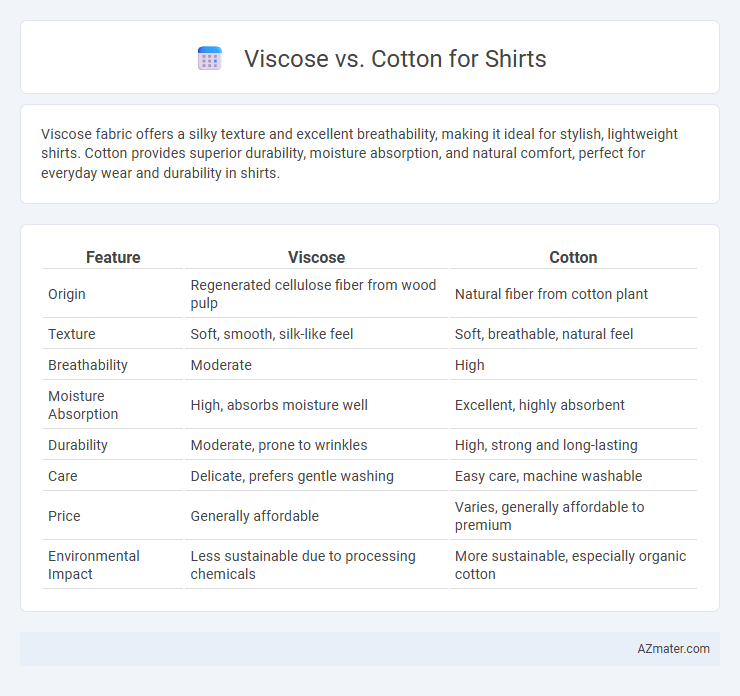Viscose fabric offers a silky texture and excellent breathability, making it ideal for stylish, lightweight shirts. Cotton provides superior durability, moisture absorption, and natural comfort, perfect for everyday wear and durability in shirts.
Table of Comparison
| Feature | Viscose | Cotton |
|---|---|---|
| Origin | Regenerated cellulose fiber from wood pulp | Natural fiber from cotton plant |
| Texture | Soft, smooth, silk-like feel | Soft, breathable, natural feel |
| Breathability | Moderate | High |
| Moisture Absorption | High, absorbs moisture well | Excellent, highly absorbent |
| Durability | Moderate, prone to wrinkles | High, strong and long-lasting |
| Care | Delicate, prefers gentle washing | Easy care, machine washable |
| Price | Generally affordable | Varies, generally affordable to premium |
| Environmental Impact | Less sustainable due to processing chemicals | More sustainable, especially organic cotton |
Overview of Viscose and Cotton Fabrics
Viscose is a semi-synthetic fiber made from cellulose derived from wood pulp, offering a smooth texture and excellent breathability, often used in lightweight shirts for its silky feel and drape. Cotton is a natural fiber cultivated from the cotton plant, renowned for its durability, moisture absorption, and comfort, making it a popular choice for everyday shirts that need to withstand frequent washing. Both fabrics vary in maintenance requirements, with viscose requiring gentle care to prevent shrinking and cotton being more resilient and easy to launder.
Production Process: Viscose vs Cotton
Viscose production involves chemically dissolving cellulose extracted primarily from wood pulp, followed by regenerating it into fibers through a wet spinning process, which requires significant water and chemical usage. In contrast, cotton is a natural fiber harvested directly from the cotton plant, undergoing mechanical ginning and minimal chemical processing before spinning into yarn, resulting in a more sustainable and less chemically intensive production. The environmental impact of viscose manufacturing is higher due to chemical waste and energy consumption, whereas cotton cultivation demands substantial water and pesticide inputs, influencing overall sustainability in shirt production.
Environmental Impact Comparison
Viscose production involves significant deforestation and chemical use, contributing to habitat loss and water pollution, while conventional cotton farming relies heavily on pesticides and large water consumption, leading to soil degradation and water scarcity. Sustainable practices like organic cotton cultivation reduce environmental harm by minimizing chemicals and water usage, whereas eco-friendly viscose alternatives use responsibly sourced wood and closed-loop manufacturing to lower ecological footprints. Overall, organic cotton offers a more water-efficient and less chemically intensive option, but responsibly produced viscose can provide a balanced eco-conscious choice for shirt fabrics.
Comfort and Breathability
Viscose offers a silky texture that enhances comfort by providing a smooth, cool feel against the skin, while cotton excels in breathability due to its natural fibers that allow better air circulation. Cotton shirts absorb moisture effectively, keeping the wearer dry, whereas viscose tends to retain some moisture, impacting overall comfort in hot, humid conditions. For optimal breathability and comfort in warm climates, cotton remains the preferred choice, but viscose provides a luxurious softness favored in cooler settings.
Durability and Longevity
Viscose shirts generally offer a smooth, silky feel but tend to have lower durability compared to cotton, as they can weaken when wet and are prone to pilling. Cotton shirts provide superior longevity due to their natural fiber strength, breathability, and resistance to frequent washing and wear. For long-lasting shirts that withstand regular use, cotton remains the more durable and resilient option.
Cost Differences Between Viscose and Cotton
Viscose shirts generally cost less than cotton shirts due to cheaper raw materials and manufacturing processes. Cotton, especially organic or high-quality long-staple varieties, commands higher prices because of labor-intensive farming and cultivation. Price differences impact consumer choices, with viscose favored for affordable fashion and cotton valued for durability and natural fiber benefits.
Care and Maintenance Requirements
Viscose shirts require gentle hand washing or delicate machine cycles and should be air-dried to prevent fabric weakening and shrinking, while cotton shirts are more durable, tolerating regular machine washing and higher heat drying without significant damage. Viscose is prone to wrinkles and may need careful ironing at low temperatures to avoid scorching, whereas cotton is easier to iron and maintain its crispness. Both fabrics benefit from avoiding bleach, but viscose demands more cautious care to preserve its smooth texture and longevity.
Aesthetic Appeal and Style
Viscose offers a silky, smooth texture that drapes elegantly, enhancing the aesthetic appeal of shirts with a subtle sheen and vibrant color retention. Cotton provides a classic, breathable fabric that creates a casual, timeless style with a matte finish and natural softness. Shirts made from viscose often convey a more polished, formal look, while cotton shirts emphasize comfort and versatility in everyday wear.
Skin Sensitivity and Allergen Considerations
Viscose fabric is generally softer and smoother on the skin, making it a suitable choice for individuals with sensitive skin, as it is less likely to cause irritation compared to some cotton varieties. Cotton, especially organic cotton, is hypoallergenic and breathable but may retain more moisture, potentially aggravating sensitive skin or allergies. Both fabrics require careful washing to avoid residue from detergents or chemicals that can trigger skin reactions.
Best Occasions and Uses for Each Fabric
Viscose shirts excel in draping and moisture-wicking, making them ideal for casual outings and warm-weather events where comfort and breathability are essential. Cotton shirts offer superior durability and breathability, perfect for everyday wear, office settings, and outdoor activities requiring easy care and long-lasting softness. Choosing between viscose and cotton depends on the occasion's demand for elegance versus practicality, with viscose favored for stylish, lightweight garments and cotton for versatile, everyday comfort.

Infographic: Viscose vs Cotton for Shirt
 azmater.com
azmater.com